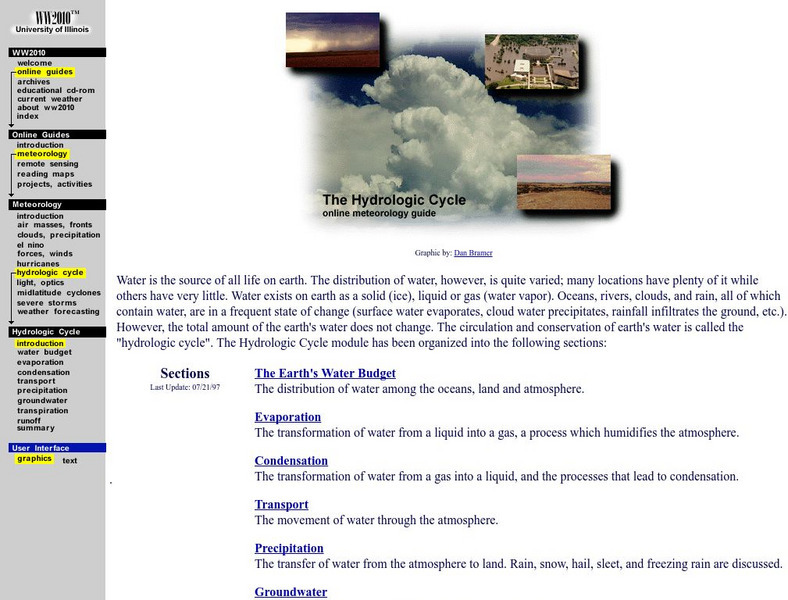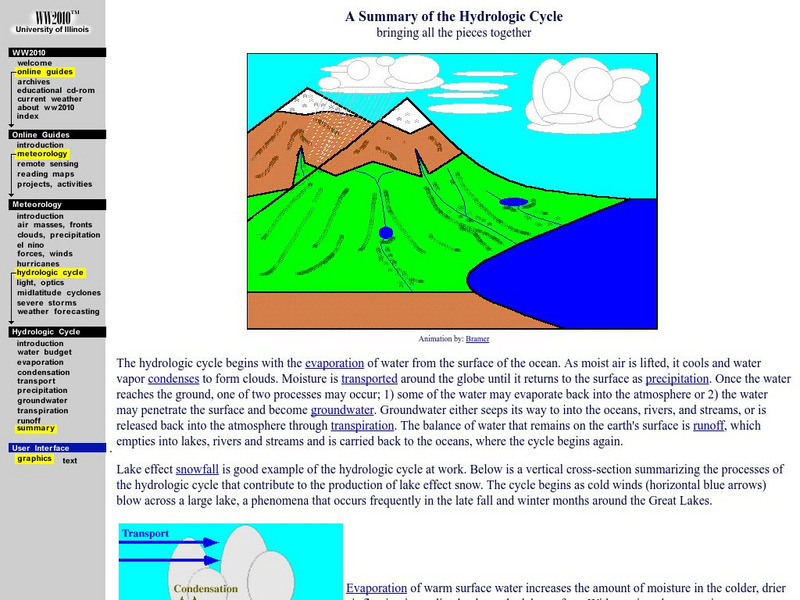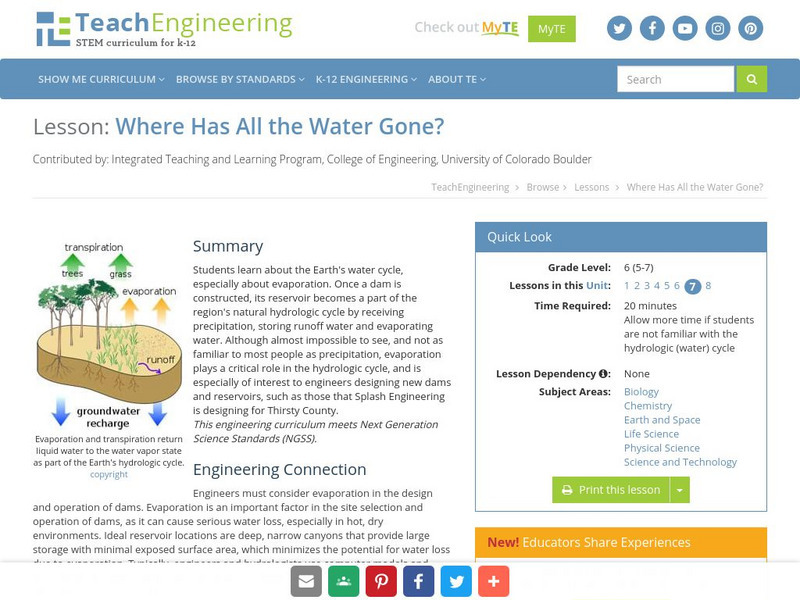Curated OER
Testing Your Water
Young scholars perform several water quality tests on groundwater from their area. They use test strips to determine the pH, hardness, alkalinity, nitrates, iron and chloride levels.
Curated OER
Ecosystem In A Bottle
Ecosystem activities show how everyone and everything is interconnected. The smallest change can make a big impact.
Curated OER
Global Change- Time and Cycles
Students study trees and their growth. In this investigative instructional activity students work in groups to reconstruct a 50 year climatic history using a simulated tree ring.
Curated OER
Water Quiz
Students use a digital atlas to explore the effects of water on landscapes. They view view pictures and complete worksheets to study the properties of water. Students study the water cycle and the chemical role it plays in living cells.
Curated OER
Measurement: When Degrees Matter
Eighth graders record the temperature change of the beakers. In this general science lesson, 8th graders create their own data table for recording observations. They discuss experimental results and cite real life applications.
Curated OER
Ground Surfaces and Infiltration
Students study permeability and apply the concept to different types of ground materials. In this ground surfaces instructional activity students complete a lab and fill out a table of their results.
Curated OER
Science: Arsenic and Old Lace
Pupils read about specific instances of arsenic in history and share these stories with each other. They identify, after reading the articles and sharing, what role arsenic played, how arsenic enters the system and what its effects are....
Curated OER
Water Retention and Soil Variation in Local Ecosystems
Students identify the differences in local soil types and the relationship between soil size and water retention. They are introduced to microenvironmental conditions in ecosystem sustainability.
Curated OER
Campus Nitrogen Budget
Students are given guidelines to college level nitrogen budgeting. Students brainstorm the campus links to nitrogen budget. Students pick topics or subtopics for individual or group research. Students develop research plan, keep good...
Curated OER
Science: 4 X 4
Students generate four statements and four questions based on their current level of understanding of the article from the engage lesson. They
evaluate the statements and questions that they have generated and those of their classmates...
Curated OER
Water Taste Test
Students brainstorm the different characteristics of potable water. In this general science lesson, students test several water samples and hypothesize which samples and brands they are. They discuss where drinking water came from and...
Curated OER
Arsenic Globally
Students, using directed questions, identify five internet resources. They use these resources to identify relevant information by highlighting those sections that address the provided questions. Students present the answers to these...
Curated OER
Ecology: Effects of Land Use on Natural Streams
Eighth graders examine how humans affect various ecosystems. In this ecology activity, 8th graders discuss different ways that contaminants enter the stream. They explain the consequences of eutrophication in lakes.
Curated OER
Junior Engineering Surface Water
Pupils experience the effects of pollution and erosion on a model of a watershed and explore ways to change the outcome.
Curated OER
Exploring Our Watershed System
Students examine how watershed systems are made up, and visit the Susquehanna watershed system and map out the system. They evaluate the order of watercourses in their area.
Curated OER
Super Stream Keeper's
Students are introduced to Delaware's waterways as precious resources used for drinking water, water for agricultural and industrial uses, recreational areas, and as habitats for wildlife. They are introduced to wastewater discharges,...
Curated OER
Water Web
In this water web worksheet, students explore, analyze and discuss how weather stations interact with maintaining weather conditions and answer two essay questions and ten multiple choice questions.
Curated OER
Power, Pollution, Pros and Cons
Students review what they know about non-renewable energy, compare and contrast advantages and drawbacks of each type, such as cost of energy sources, feasibility, air pollution, water pollution, and other risks, and create table listing...
Vision Learning
Visionlearning: Earth Science: The Hydrologic Cycle: Water's Journey
Instructional module focusing on the hydrological cycle. Discussion includes the movement of water through the different reservoirs on earth and its impact on climate and weather patterns. Site also includes an interactive practice quiz...
University of Illinois
University of Illinois Urbana Champaign: The Hydrologic Cycle
Water is the source of life on earth. It exists in many forms and is constantly changing. The circulation and conservation of earth's water is called the hydrologic (or water) cycle. Find out how water evaporates, condensates,...
US Geological Survey
U.s. Geological Survey: What Is the Water Cycle?
A quick summary of the water cycle that includes a diagram of the cycle, with links to in-depth explanations of each component of the cycle. Click "water-cycle home" to access water-cycle resources in a variety of languages.
University of Illinois
University of Illinois Urbana Champaign: A Summary of the Hydrologic Cycle
Animation and text explain the water--or hydrologic--cycle, which is the process that water undergoes in nature.
Center for Educational Technologies
Earth Science Explorer: The Water Cycle
This is a very brief overview of the water cycle, but it does have a nice graphical representation.
TeachEngineering
Teach Engineering: Where Has All the Water Gone?
Students learn about the Earth's water cycle, especially about evaporation. Once a dam is constructed, its reservoir becomes a part of the region's natural hydrologic cycle by receiving precipitation, storing runoff water and evaporating...























